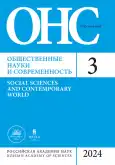Canada’s Green Strategy as a Factor in Countering Global Challenges
- 作者: Solyanova M.V.1
-
隶属关系:
- Primakov National Research Institute of World Economy and International Relations of the Russian Academy of Sciences
- 期: 编号 3 (2024)
- 页面: 64-81
- 栏目: Климатическая повестка
- URL: https://journals.eco-vector.com/0869-0499/article/view/676231
- DOI: https://doi.org/10.31857/S0869049924030051
- EDN: https://elibrary.ru/ZWRVKA
- ID: 676231
如何引用文章
详细
Canada, like many other countries, is increasingly focusing on transition to a green economy, realizing the problems associated with climate change, carbon emissions and the growing need for energy conservation. Canada is a large country with huge resources and potential for the development of a green economy. The Canadian approach to implementing a green strategy based on clean technologies and best production methods is comprehensively explored. Key government policies and programs to stimulate the development of green sectors of the economy, reduce greenhouse gas emissions and combat climate change are analyzed. The main projects and initiatives aiming to accelerate the transition to renewable energy sources and increase the level of energy efficiency, as well as measures to stimulate environmental consumption among the population and attract foreign investment in the field of green economy, were studied. The role of provinces, territories and municipalities in the development of a green economy are also discussed.
全文:
作者简介
Maria Solyanova
Primakov National Research Institute of World Economy and International Relations of the Russian Academy of Sciences
编辑信件的主要联系方式.
Email: solyanova.maria@gmail.com
ORCID iD: 0000-0002-4974-4508
Candidate of Sciences (Politics), Research Fellow, Center for North American Studies
俄罗斯联邦, Moscow参考
- Минтаева Э.И., Голденова В.С., Слободчикова И.В. (2021) «Зеленые» технологии как фактор устойчивого развития национального государства // Научные труды ВЭО России. Том 230. https://doi.org/10.38197/2072-2060-2021-230-4-423-430
- Mintaeva E`.I., Goldenova V.S., Slobodchikova I.V. (2021) “Zeleny`e” texnologii kak faktor ustojchivogo razvitiya nacional`nogo gosudarstva [Green Technologies as a Factor in the Sustainable Development of a National State]. Nauchnye trudy VE`O Rossii. Vol. 230. https://doi.org/10.38197/2072-2060-2021-230-4-423-430 (In Russ.)
- Соков И.А. (2022) «Зеленый новый курс» США и Канады в 2021 году // Россия и Америка в XXI веке. Выпуск № 2. https://doi.org/10.18254/S207054760019832-2
- Sokov I.A. (2022) “Zelyony`j novy`j kurs” SShA i Kanady` v 2021 godu [Green New Deal in the USA and Canada in 2021]. Rossiya i Amerika v XXI veke. Issue 2. https://doi.org/10.18254/S207054760019832-2 (In Russ.)
- Трефилова Ю. (2021) Зеленый путь для избранных? // Российский совет по международным делам. 19.02.2021. (https://russiancouncil.ru/analytics-and-comments/columns/ecology/zelenyy-put-dlya-izbrannykh/)
- Trefilova Yu. (2021) Zeleny`j put` dlya izbrannyh? [Green Path for the Elite?]. Rossijskij sovet po mezhdunarodny`m delam. 19.02.2021. (https://russiancouncil.ru/analytics-and-comments/columns/ecology/zelenyy-put-dlya-izbrannykh/) (In Russ.)
- Хорошилов Е.Е. (2020) Механизмы устойчивого финансирования: опыт Канады // Экономические системы. № 4. С. 230–243.
- Horoshilov E.E. (2020) Mexanizmy` ustojchivogo finansirovaniya: opyt Kanady [Sustainable Finance Mechanisms: Canadian Experience]. Ekonomicheskie sistemy. no. 4, pp. 230–243. (In Russ.)
- Aliakbari M. (2023) Environmental Ranking for Canada and the OECD: Third Edition. Fraser Institute. (https://www.fraserinstitute.org/sites/default/files/environmental-ranking-for-canada-and-the-oecd-3rd-edition.pdf)
- Cairns R.D. (1992) Natural Resources and Canadian Federalism: Decentralization, Recurring Conflict, and Resolution // Publius. no. 22. pp. 55–70.
- Cutean A., Matthews M., O’Neill K. (2022) Thinking Green: Building a Sustainable Digital Economy for Canada. Information and Communications Technology Council (ICTC). (https://www.digitalthinktankictc.com/reports/thinking-green#report)
- Jackson J. (2022) Collaboration: The Key to Canada’s Net Zero Transition. Canadian Science Policy Centre. December 2022. (https://sciencepolicy.ca/posts/collaboration-the-key-to-canadas-net-zero-transition)
- Jonathan A., Samson R., Gibson S., Ding A., Felder M. (2022) Net Zero Opportunities: A Province-by-Province Comparison. Canadian Climate Institute. (https://climateinstitute.ca/wp-content/uploads/2022/05/Provincial-summary-EN.pdf)
- O’Neill D.W. (2023) Herman E. Daly (1938–2022) // Nature Sustainability. no. 6. pp. 118–119. https://doi.org/10.1038/s41893-022-01041-0
- Pearce D. (2002) An Intellectual History of Environmental Economics // Annual Review of Energy and the Environment. Vol. 27. November 2002. https://doi.org/10.1146/annurev.energy.27.122001.083429
- Aliakbari M. (2023) Environmental Ranking for Canada and the OECD: Third Edition. Fraser Institute. (https://www.fraserinstitute.org/sites/default/files/environmental-ranking-for-canada-and-the-oecd-3rd-edition.pdf)
补充文件












